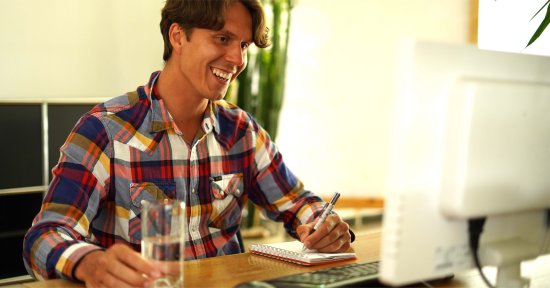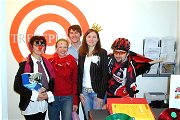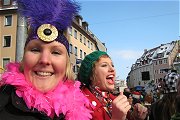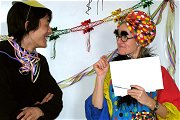Public Festivals in Germany
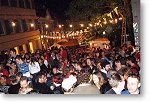
Volksfest "Sandkerwa"
A known German proverb says: "Festivities have to be celebrated the time they are." An English version of that could be: "Christmas comes but once a year." Every year there are about 10,000 occasions where public festivals are celebrated, so there is always a possibility to have some fun: Whether it's a parish fair, a riflemen's meeting, a religious festivity, a pageant or some sort of jubilee - in Germany about 200 million visitors participate in these events.
Our latest news always on Facebook.com/sprachinstitut.treffpunkt.online
This site's categories:
Private Online Lessons GERMAN 2025 |
A known German proverb says: "Festivities have to be celebrated the time they are." An English version of that could be: "Christmas comes but once a year." Every year there are about 10,000 occasions where public festivals are celebrated, so there is always a possibility to have some fun: Whether it's a parish fair, a riflemen's meeting, a religious festivity, a pageant or some sort of jubilee - in Germany about 200 million visitors participate in these events.
Below we will describe an important and popular festival that is either at the top of the list of big public festivals or which shows the local culture and way of living. We laid the priority in the region of "Franken".
At the bottom of this site you can find a link list with further information in English.
| January | Heilige Drei Könige - The Three Hallowed KingsJanuary is one of the months with the fewest festivities, (although carnival in Cologne, Dusseldorf, Mayence and Munich have either started on the 11th of November at 11.11am or will start the day after the "Heilige Drei Könige". ) But many have to recover from New Year's Eve parties, so they celebrate the profound festivity of the "Heilige Drei Könige" on the 6th of January.
| |||
| ||||
| February | Carnival* (Fasching)Now the "crazy days" of carnival are at the peak of interest. From Maundy Thursday until carnival's Tuesday there are many big parties throughout Germany. There are not many eyes and throats staying dry... History: Some of the highlights of carnival are the carnival pageants, which take place on carnival's Sunday, Monday or Tuesday. Whoever wants to be part of the "crazy days" should have some information sotred by main carnival cities in Germany:
* By the way: The derivation of the word "carnival" is Italian, and means "carne vale!" . It's a Good Bye to Lent. In Germany carnival ("Karneval") is also called "Fasching" or "Fastnacht". | |||
| March | Starkbierzeit - "Time of Strong Beer"Two weeks after Ash Wednesday starts the "Starkbierzeit" in Bavaria, which is especially popular in Munich (German). History: There are some traditions connected to the "Starkbierzeit". For example the "Derblecken" or "Tratzen" is,when the cabaret artists make fun of politicians and prominence. | |||
| March/ April | Easter
In Central Europe the end of winter is highlighted with Easter. Exactly 46 days after Ash Wednesday, with the end of carnival, Easter Sunday is celebrated. It is the celebration of the Easter egg, paschal lamb, Easter fires, Easter well,.. . Even more terms related to Easter can be found at www.German-easter-holiday.com (English). Besides the bunny and the lamb, the egg is especially important at Easter. No matter if it's a chocolate egg or a real one, a decoration on some boards or a colorfully painted breakfast egg - Easter without an Easter egg can't be imagined in Germany. Since pre-Christian times the egg has been used as a symbol for awakening nature and fertility. It has a great significance in many nations. So that the origin of Easter should not be forgotten: on Easter Sunday Christians celebrate the resurrection of Jesus, with death not seen as the end, but as the beginning of a new life....(more) Some links with information about the tradition of the decorated Easter wells in "Franconian Switzerland":
... and about Easter in Germany in general (pages in German):
At the end of April there is another event that is celebrated: WalpurgisnightHistory: In many places even the Walpurgisnight on the 30th of April is something very special. The legend says, witches dance around a big fire on this night. They are welcomed with fireworks, dancing and a witchfire. | |||
| May | "Erlanger Bergkirchweih"Berch.info is the oficial website of the Bergkirchweih. At www.der-berg-ruft.de there will be also current information during the festival. Once a year a well - known beer-festival takes part one week before Whitsun in Erlangen, Franconia. History: Nowadays this festival is popular among young people who start dancing and singing on the tables every evening. Whoever wants to party in such an atmosphere has the chance to do so at the Anna-Fest in Forchheim. | |||
| June | "Kieler Woche" - The week of Kielwww.kieler-woche.de (German/English) About 3.5 million people come to Keil for the biggest sailing event in the world. Participants include more than 5,000 sailors with 2,000 boats. Besides being a sportive and cultural event, "Kieler Woche" is a grand folk-fair as well. With the command "Leinen los!" ("drop the lines") the big event is opened with great interest from the crowd and starts with the traditional "Aalregatta" (Eel-regatta) from Kiel to Eckernförde. About 200 sailors take part in this leisurely race. Another sight is the world cup of the high-seas yachts "Mumm 36". People that are interested in sailing should not miss the Hanse Sail (English) in Rostock. It is also possible to take part in some of the popular sailing events. | |||
| July | "Annafest" in Forchheimwww.annafest-forchheim.de (German) Similar to the Bergkirchweih in Erlangen this traditional public fair takes place every year during the last week in July in Forchheim on the "cellar-hill" (close to Bamberg). History:
Up to 500,000 visitors are attracted to the cellar-hill during the ten days of the festival. With 30,000 seats there is more space to sit there than at the festival in Erlangen, (the Bergkirchweih). It is possible to sit and eat in the middle of the forest and drink your beer. From 1p.m. to 11 p.m. bands play a variety of songs. Even more: there is a range of different show-booths and fair-attractions. The best way to get there is by public transport. The walk from the train station takes about ten minutes. | |||
| August | Bamberger Sandkerwawww.sandkerwa.de (German) The biggest festival in the town of Bamberg and an attraction to all guests is the so called "Sandkerwa" which takes place every year at the end of August. In the narrow streets of "Im Sand" (a district close to the river Regnitz) there is a long-lasting state of exception. Many inner courts and houses are opened on these days and many of the old romantic places are changed into wine-inns or pubs. At the public places and in the hotels there are bands playing different kinds of music: from German folkmusic to Rock and Pop to Salsa and Samba. A site with pictures of the "Sandkerwa" and the old town of Bamberg you can find here (German)! History: The biggest event is the "Fischerstechen" ("Fishermen's Sticking") on Sunday. A spectacle, where two young men standing on narrow fishing boats in the middle of Regnitz, try to push each other down with stuffed lances. The pushing movement of the lance is called "Stechen" - sticking. People from other regions also come to participate in this event. The finale is a big fireworks display on Monday evening. | |||
| September | Harvest festivalsSeptember in German wine regions is the time of vintage and wine festivals No matter if it's at the Rhine, Moselle, Palatine or Main: everyone who likes wine will find something that suits their taste. Here you can find a small amount of festivals in the Franconian region (all in German): An overview of all Franconian wine festivals you can find here: www.weinfeste-online.de (German); www.weinfeste-xxl.de (German) or www.wein-plus.eu (English).
| |||
| October | "Oktoberfest" in Munichwww.oktoberfest.de (German/English) In September/ October the most interesting folk festival of all takes place, the "Oktoberfest" in Munich, also called "Wiesn" (meadow). Every year more than six million people visit this festival, making it the largest folk festival in the world. History: The name "Oktoberfest" is somewhat irritating: every year the festivities take part during the last two weeks of September and only during the first week of October. Although many people know of the festival, you can find some more information below:
| |||
| November | Hamburg's DOMKnown as the largest funfair in Northern Germany, Hamburg's Dom exists as winter- dom (7. Nov. -7. Dec. 2003) and summer- dom (30. July- 29. Aug. 2017). It's a "classical" fun fair with show-booths, food-tents and fair-attractions. During the weekend many families come to the join in on the festivities. In the evenings visitors from nearby "St. Pauli" come here party on. It is standard for each visitor to receive a gingerbread-heart placed around his neck, along with a paper bag full of fried almonds and popcorn. When you start to get dizzy from the fair-attractions or become full from eating too much, it is time to go home. A permanent variant like this folks festival exists in Austria: the Prater in Vienna. (English) | |||
| December | Nuremberg Christkindles Marketwww.christkindlesmarkt.de (English). A lot of pictures you can find at: www.nuernbergerchristkindlesmarkt.de (German) Christmas Markets, opening with the beginning of Advent, can give one some good ideas for Christmas presents. One of the most beautiful and popular Christmas Markets is in Nuremberg. It starts on the Friday before the first Advent. History: Close to the marketplace there is also an international Christmas Market. Here visitors can find Christmas traditions from France, the Czech republic, Poland, Lithuania, Russia, Ukraine and Great Britain. Common information about Christmas in Germany you can find on our Christmas page. | |||
| ||||
| Definitions | Public Festival This is a festival, where at least one beer or wine tent exists as well as some booths and fair-attractions. | |||
Parish Fair - "Kirchweih" In Middle- or Northern Germany it is called "Kirmes" or "Kerb", in Franconia "Kerwa", in Switzerland called "Kilbe" or "Chilbi", in Austria "Kirta". | ||||
for further information about German fairs in English have a look at
If you are a tourist from other countries and want to visit Germany, you need to own a driver's license. You can create it easily by using International Drivers License in Germany service | ||||
We would appreciate any comment or suggestions. Please write to info@learn-german-online.net
![]()
>>> Here is the course programme "German super intensiv home tuition programm" by Sprachinstitut TREFFPUNKT-ONLINE .
